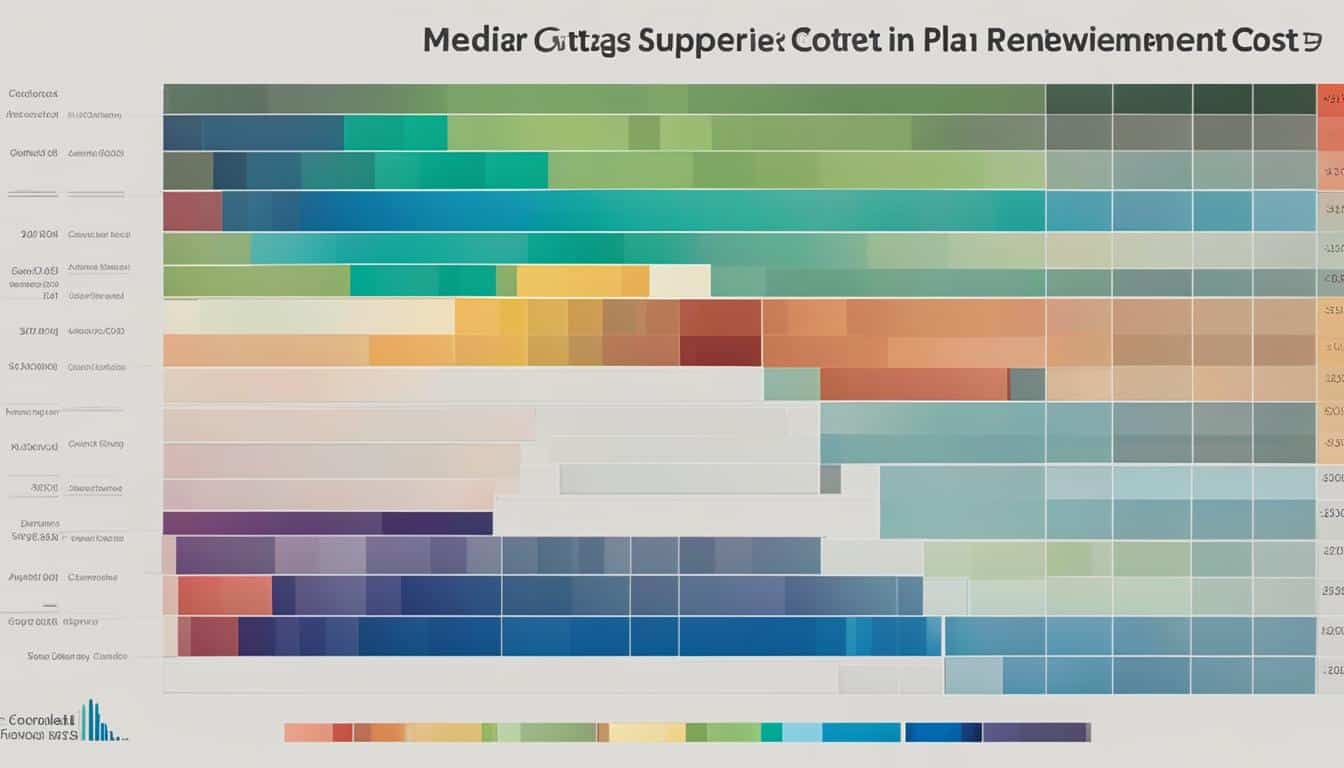If you’re eligible for Medicare, you may be considering a Medicare Supplement Plan to help cover some of your out-of-pocket expenses. However, it’s important to understand the costs associated with these plans to make an informed decision.
There are several factors that can affect the costs of Medicare Supplement Plans, including your location, age, gender, and health status. Additionally, the level of coverage you choose and the insurance company you select can impact your premiums. By understanding how these costs are calculated, you can make a more informed decision about your healthcare coverage.
Key Takeaways:
- Medicare Supplement Plan costs can vary based on several factors including age, location, and health status.
- The level of coverage and insurance company you choose can also impact your premiums.
- Understanding the costs of Medicare Supplement Plans can help you make an informed decision about your healthcare coverage.
- Working with an independent Medicare agent can help you navigate the complexities of plan costs and find the most cost-effective option for your needs.
- Price is an important consideration when choosing a plan, but it shouldn’t be the sole factor. Benefits offered, insurance company reputation, and specific healthcare needs should also be taken into account.
What are Medicare Supplement Plans?
Before delving into the costs of Medicare Supplement Plans, it’s important to understand what they are. Medicare Supplement Plans are privately sold insurance policies that help cover some out-of-pocket expenses that Original Medicare doesn’t cover, such as deductibles, coinsurance, and copayments.
These plans are also known as Medigap plans because they fill gaps in Medicare coverage. Medicare Supplement Plans don’t provide standalone benefits and are used in conjunction with Original Medicare.
There are ten standardized plan types available in most states, with each plan offering a different level of coverage. Some states offer additional plans, and not all plans are available in every state.
Each plan type is identified by a letter, from Plan A to Plan N. The benefits offered by each plan type are standardized, regardless of the insurance company offering them. This means that the coverage provided by Plan A from one insurance company will be the same as Plan A coverage from another insurer.
What are the benefits of Medicare Supplement Plans?
Medicare Supplement Plans provide peace of mind by reducing your out-of-pocket expenses. This is especially important if you have a chronic illness, need frequent medical care, or require a significant amount of prescription drugs. The coverage provided by these plans can help protect you from financial ruin due to overwhelming medical bills.
These plans also give you flexibility in choosing healthcare providers, as they don’t have networks like Medicare Advantage plans do. You can see any healthcare provider that accepts Medicare, which is especially important if you have a preferred doctor or specialist.
Finally, Medicare Supplement Plans have a guaranteed renewal provision, meaning that as long as you pay your premiums on time, your coverage cannot be cancelled, regardless of changes to your health status.

Factors Affecting Medicare Supplement Plan Costs
Several factors contribute to the costs of Medicare Supplement Plans. Understanding these factors will help you estimate your expenses and budget accordingly. Your monthly premium is influenced by:
| Factor | Description |
|---|---|
| Location | The state you live in can impact your premiums. Insurance companies use different methods to calculate rates, so it’s essential to compare costs across multiple providers. |
| Age | The older you are, the higher your premiums are likely to be. This is because older individuals tend to require more medical care than younger ones. |
| Gender | Insurance companies may charge men and women different premiums based on actuarial data. Women, for example, may have higher premiums due to longer life expectancy and a higher likelihood of some healthcare conditions. |
| Health Status | Your health status plays a significant role in determining your premiums. If you have a pre-existing condition or medical history that requires frequent medical attention, you may face higher premiums. On the other hand, if you’re in excellent health, you may be able to secure lower premiums. |
| Coverage Level Chosen | The level of coverage you choose will impact your monthly premiums. Plans with more comprehensive coverage tend to have higher premiums than those with more limited coverage. |
| Insurance Company | Insurance companies have different pricing structures, so it’s essential to compare plans across multiple providers to find the best value for your money. |
By considering these factors, you can get a better understanding of the expenses you’ll face with a Medicare Supplement Plan. Keep in mind that the lowest-priced plan may not always be the best option for your specific healthcare needs and budget. Be sure to weigh all your options and consult with a knowledgeable Medicare agent to make the best decision for your situation.

Types of Costs Involved in Medicare Supplement Plans
Medicare Supplement Plans, also known as Medigap plans, offer additional coverage for services not covered by Original Medicare. Understanding the types of costs involved in Medicare Supplement Plans can help you make informed decisions about your healthcare coverage.
The following are the main types of costs involved:
- Premiums: These are the monthly payments you make to maintain your coverage. The amount of premiums you pay will depend on various factors, including your age, gender, location, and health status. Insurance companies may also consider other factors, such as whether or not you smoke, when calculating your premiums.
- Deductibles: This is the amount you pay out-of-pocket before your Medicare Supplement Plan coverage kicks in. Deductibles can vary depending on your plan, and some plans may not have deductibles at all.
- Co-pays: This is a fixed amount you pay for medical services, such as doctor visits or prescription drugs. Your plan may have different co-pay amounts for different services.
- Coinsurance: This is the amount you are responsible for paying after your Medicare coverage and your Medicare Supplement Plan coverage have been applied. Coinsurance amounts can vary depending on your plan.
It’s important to note that some Medicare Supplement Plans may have different types of costs or may not cover certain expenses. For example, some plans may cover foreign travel emergencies, while others may not. Reviewing the details of each plan carefully can help you choose the one that best fits your healthcare needs and budget.

Comparing Premium Rates
It’s wise to compare premium rates from different insurance companies before choosing a Medicare Supplement Plan. You may find that premiums can vary significantly between providers for the same plan, depending on factors such as your location and age.
When comparing premium rates, it’s essential to ensure that you are comparing apples to apples. For example, a plan with a lower premium may have higher co-pays or deductibles, which could end up being more expensive in the long run. Consider your specific healthcare needs and budget when choosing a plan.
Working with an independent Medicare agent, such as Integrity Now Insurance Brokers, can help you navigate the complexities of Medicare Supplement Plan costs. These experts can provide unbiased advice and assist you in finding the most cost-effective plan for your needs.
Comparing Medicare Supplement Plan Rates
When it comes to Medicare Supplement Plans, rates can vary greatly depending on the insurance company and the plan you choose. It’s essential to compare rates from different providers to ensure you’re getting the best value for your healthcare needs.
Comparing rates is a crucial part of the process when selecting a Medicare Supplement Plan. Not doing so could result in paying higher premiums than necessary or missing out on benefits altogether.
To compare rates, start by researching the plans available in your area. You can use the Medicare Plan Finder tool to discover Medicare Supplement Plans available in your zip code. Be sure to consider the benefits offered by each plan, as well as the provider network and any additional costs.
Once you’ve narrowed down your options, you can contact each insurance company or agent to request a quote. Some companies even offer online tools that allow you to compare rates and benefits side-by-side.
When comparing rates, be sure to look at the total cost of the plan, not just the monthly premium. Consider factors such as deductibles, co-pays, and coinsurance, as well as any costs associated with out-of-network care.
| Tip: | When comparing rates, pay attention to the rate structure. Some plans may have a higher monthly premium, but lower out-of-pocket costs. Others may have a lower monthly premium, but higher out-of-pocket costs. Choose the plan that best fits your healthcare needs and budget. |
|---|
Comparing Medicare Supplement Plan rates can be time-consuming, but it’s essential for getting the most cost-effective coverage possible. Taking the time to research and compare rates can save you a significant amount of money in the long run.

By carefully considering the factors that contribute to the cost of Medicare Supplement Plans, you can make informed decisions that provide you with the coverage you need at a price that fits your budget. Remember to compare rates, review plan details, and seek expert guidance to ensure you’re getting the best value for your money.
Factors to Consider When Choosing a Medicare Supplement Plan
When choosing a Medicare Supplement Plan, price is an important consideration, but it shouldn’t be the only factor you evaluate. Other factors may have a significant impact on the value you receive, such as:
- Coverage: Different plans offer different levels of coverage for specific healthcare services. Look for a plan that covers the services you need most, such as prescriptions or doctor visits, at a reasonable cost.
- Insurance Company Reputation: Choose a plan from an insurance company with a solid reputation and stable financial standing to ensure they will be able to meet your needs over time.
- Your Healthcare Needs: Take into account your current health status and healthcare needs when selecting a plan. For example, if you have chronic health conditions, you may want to choose a plan with lower out-of-pocket costs.
It’s important to evaluate these factors alongside price to choose the plan that offers the most value for your healthcare dollars. A comprehensive comparison can help you make an informed decision and avoid surprises down the road.

Conclusion
Understanding the costs associated with Medicare Supplement Plans is crucial for managing your healthcare expenses. By considering factors such as plan type, insurance company, and your specific needs, you can make informed decisions that provide you with the coverage you need at a price that fits your budget.
When choosing a Medicare Supplement Plan, it’s important to understand the different types of costs involved. While price is a significant factor, you should also evaluate the benefits offered by each plan and the reputation of the insurance company.
Working with an Independent Medicare Agent
An independent Medicare agent, such as Integrity Now Insurance Brokers, can provide unbiased advice and assist you in finding the most cost-effective plan for your needs. These experts can navigate through the complexities of Medicare Supplement Plan costs and help you make informed decisions that align with your budget and healthcare needs.
With the assistance of an independent Medicare agent, you can compare rates from different providers and select the plan that offers the best value for your money.
Overall, managing your healthcare expenses is critical to maintaining your financial health. By understanding the costs associated with Medicare Supplement Plans and working with an independent agent, you can receive the coverage you need without breaking the bank.
FAQ
What factors contribute to the costs associated with Medicare Supplement Plans?
Several factors contribute to the costs of Medicare Supplement Plans, including your location, age, gender, health status, level of coverage chosen, and the insurance company you select.
What are Medicare Supplement Plans?
Medicare Supplement Plans, also known as Medigap plans, are private insurance policies that help cover certain out-of-pocket expenses not covered by Original Medicare.
What are the different types of costs involved in Medicare Supplement Plans?
The different types of costs involved in Medicare Supplement Plans include premiums (monthly payments), deductibles, co-pays, and coinsurance.
How can I compare Medicare Supplement Plan rates?
To compare Medicare Supplement Plan rates, it’s recommended to obtain quotes from different insurance providers. This will help you ensure you’re getting the best value for your healthcare needs.
How is the cost of Medicare Supplement Plans determined?
The cost of Medicare Supplement Plans is determined by factors such as your age, the type of plan you choose, and the insurance company you select. Carefully reviewing the details of each plan is crucial to understanding the coverage and associated costs.
What factors should be considered when choosing a Medicare Supplement Plan?
While price is an important consideration, other factors to consider when choosing a Medicare Supplement Plan include the benefits offered, the stability and reputation of the insurance company, and your specific healthcare needs.
How can working with an independent Medicare agent help with understanding the costs of Medicare Supplement Plans?
Working with an independent Medicare agent, such as Integrity Now Insurance Brokers, can help navigate the complexities of Medicare Supplement Plan costs. These experts provide unbiased advice and assist in finding the most cost-effective plan for your needs.
Why is it important to understand the costs associated with Medicare Supplement Plans?
Understanding the costs associated with Medicare Supplement Plans is important for managing healthcare expenses. By considering factors such as plan type, insurance company, and specific needs, informed decisions can be made that provide the desired coverage at a price that fits the budget.
How can I ensure I am getting the best value for my healthcare needs?
To ensure you are getting the best value for your healthcare needs, consult with an independent Medicare agent who can assist in finding the most cost-effective plan and provide unbiased advice based on your specific circumstances.










